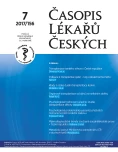Psychological problems of patients who survived cardiac arrest out of hospital
Authors:
Tereza Frýbová 1; prof. MUDr. Jan Bělohlávek, Ph.D. 1; Martina Zvěřová 2
Authors‘ workplace:
2. interní klinika – klinika kardiologie a angiologie 1. LF UK a VFN v Praze
1; Psychiatrická klinika 1. LF UK a VFN v Praz
2
Published in:
Čas. Lék. čes. 2017; 156: 379-383
Category:
Original Article
Overview
Out-of-hospital circulatory arrest is a major challenge of current medicine. Circulatory arrest survivors bear increased risk of developing anxiety disorders and depressions both during hospitalization and after discharging to the home care. Circulatory arrest survivors are not provided routinely with psychological care.
Patients included in our pilot research were identified in the register of surviving circulatory arrest. The survey was carried out using a non-standardized questionnaire. A total of 28 patients surviving the circulatory arrest were included in the pilot research. The average age of respondents was 54 years. There were 20 men and 8 women. The project showed that 18 (64.3 %) people, since they went through the critical status, have suffered from negative and bothering symptoms, such as: fear of a repeated cardiac arrest, sleeping disorders, persistent tiredness etc.
Despite the fact that our group of patients was relatively small and larger studies addressing the issue are needed, our finding is alarming – the patients after the cardiac arrest suffer from many anxious and depressive symptoms as well as from cognitive deficit. In the situation when the common psychological intervention by a specialist is not provided, it seems that an early psychological invention is highly desirable and may have a beneficial effect on return of the patients to their everyday life.
Keywords:
hospitalization, quality of life, professional intervention, mental health, cardiac arrest
Sources
1. Raudenská J, Javůrková A. Lékařská psychologie ve zdravotnictví. Grada Publishing, Praha, 2011 : 41–68.
2. Bělohlávek J, Kučera K, Jarkovský J et al. Hyperinvasive approach to out-of hospital cardiac arrest using mechanical chest compression device, prehospital intraarrest cooling, extracorporeal life support and early invasive assessment compared to standard of care. A randomized parallel groups comparative study proposal. "Prague OHCA study". J Transl Med 2012; 10 : 163.
3. Franěk O. Mimonemocniční náhlá zástava oběhu a neodkladná resuscitace dospělých v terénu. Dostupné na: www.zachrannasluzba.cz
4. Franěk O, Pokorna M, Sukupova P. Pre-hospital cardiac arrest in Prague, Czech Republic – The Utstein-style report. Resuscitation 2010; 81(7): 831–835.
5. Orel M. Psychopatologie. Grada, Praha, 2012 : 264.
6. Gawlytta R, Wintermann GB, Böttche M et al. [Posttraumatische belastungsstörung nach intensivtherapie. Häufigkeit, risikofaktoren und behandlungsansätze]. Med Klin Intensivmed Notfallmed 2017; 21 : 227.
7. Assad S, Ghani U, Sulehria T et al. Intensive care unit psychosis-sundowning: a challenging phenomenon. Indian J Crit Care Med 2017; 21(2): 112–113.
8. Bouwes A, van Poppelen D, Koelman JH et al. Acute posthypoxic myoclonus after cardiopulmonary resuscitation. BMC Neurol 2012; 12 : 63.
9. Freund B, Sutter R, Kaplan P. Lance-Adams syndrome in the pretargeted temperature management era – a case report and systematic review. Clin EEG Neurosci 2016; 48(2): 130–138.
10. Davydow DS, Gifford JM, Desai SV et al. Depression in general intensive care unit survivors: a systematic review. Int Care Med 2009; 35(5): 796–809.
11. Jaszke-Psonka M, Piegza M, Ścisło P et al. Cognitive impairment after sudden cardiac arrest. Kardiochirurgia i Torakochirurgia Polska 2016; 13(4): 393–398.
12. MKN-10. Dostupné na: www.uzis.cz/cz/mkn/seznam.html, http://apps.who.int/classifications/icd10/browse/2016/en
13. Grendas LN. Posttraumatic stress disorder: conceptualization and psychopharmacological treatment update. Vertex 2016; 27(126): 142–152.
14. DSM-5. Diagnostický a statistický manuál duševních poruch. První české vydání. Portál, Praha, 2015.
15. Wilder Schaaf KP, Artman LK, Peberdy MA et al. Anxiety, depression, and PTSD following cardiac arrest: a systematic review of the literature. Resuscitation 2013; 84(7): 873–877.
16. MoCA – Montreal Cognitive Assessment. Dostupné na: www.mocatest.org
17. Kamphuis HC, De Leeuw JR, Derksen R et al. A 12-month quality of life assessment of cardiac arrest survivors treated with or without cardioverter defibrillator. Europace 2002; 4(4): 417–425.
18. Lilja G, Nilsson G, Nielsen N et al. Anxiety and depression among out-of-hospital cardiac arrest survivors. Resuscitation 2015; 97 : 68–75.
19. Ørbo M, Aslaksen PM, Larsby K et al. Alterations in cognitive outcome between 3 and 12 months in survivors of out-of-hospital cardiac arrest. Resuscitation 2016; 105 : 92–99.
Labels
Addictology Allergology and clinical immunology Angiology Audiology Clinical biochemistry Dermatology & STDs Paediatric gastroenterology Paediatric surgery Paediatric cardiology Paediatric neurology Paediatric ENT Paediatric psychiatry Paediatric rheumatology Diabetology Pharmacy Vascular surgery Pain management Dental HygienistArticle was published in
Journal of Czech Physicians

- Advances in the Treatment of Myasthenia Gravis on the Horizon
- Possibilities of Using Metamizole in the Treatment of Acute Primary Headaches
- Metamizole at a Glance and in Practice – Effective Non-Opioid Analgesic for All Ages
- Metamizole vs. Tramadol in Postoperative Analgesia
- Spasmolytic Effect of Metamizole
-
All articles in this issue
- Intestinal transplantation in Czech Republic
- Indications to liver transplantation
- Pros and cons of dual kidney transplantation
- Psychological evaluation of uterus transplantation trial participants
- Psychological problems of patients who survived cardiac arrest out of hospital
- Current macro-diagnostic trends of forensic medicine in the Czech Republic
- The Guideline on Spiritual Care of the Ministry of Health of the Czech Republic
- Organ transplantation from donors after circulatory death
- Journal of Czech Physicians
- Journal archive
- Current issue
- About the journal
Most read in this issue
- Indications to liver transplantation
- Intestinal transplantation in Czech Republic
- Organ transplantation from donors after circulatory death
- Psychological problems of patients who survived cardiac arrest out of hospital
